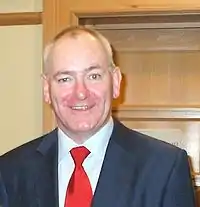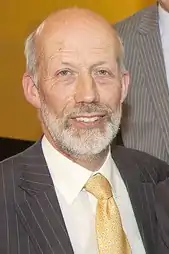2003 Northern Ireland Assembly election
The 2003 election to the Northern Ireland Assembly was held on Wednesday, 26 November 2003, after being suspended for just over a year. It was the second election to take place since the devolved assembly was established in 1998. Six members from each of Northern Ireland's eighteen Westminster Parliamentary constituencies were elected by single transferable vote, giving a total of 108 Members of the Legislative Assembly (MLAs). The election was contested by 18 parties and a number of independent candidates.
| |||||||||||||||||||||||||||||||||||||||||||||||||||||||||||||||||||||||||||||||||||||||||||||||||||||||||||||||||||||||||
All 108 seats to the Northern Ireland Assembly 55 seats needed for a majority | |||||||||||||||||||||||||||||||||||||||||||||||||||||||||||||||||||||||||||||||||||||||||||||||||||||||||||||||||||||||||
|---|---|---|---|---|---|---|---|---|---|---|---|---|---|---|---|---|---|---|---|---|---|---|---|---|---|---|---|---|---|---|---|---|---|---|---|---|---|---|---|---|---|---|---|---|---|---|---|---|---|---|---|---|---|---|---|---|---|---|---|---|---|---|---|---|---|---|---|---|---|---|---|---|---|---|---|---|---|---|---|---|---|---|---|---|---|---|---|---|---|---|---|---|---|---|---|---|---|---|---|---|---|---|---|---|---|---|---|---|---|---|---|---|---|---|---|---|---|---|---|---|---|
| Turnout | 63.0% | ||||||||||||||||||||||||||||||||||||||||||||||||||||||||||||||||||||||||||||||||||||||||||||||||||||||||||||||||||||||||
| |||||||||||||||||||||||||||||||||||||||||||||||||||||||||||||||||||||||||||||||||||||||||||||||||||||||||||||||||||||||||
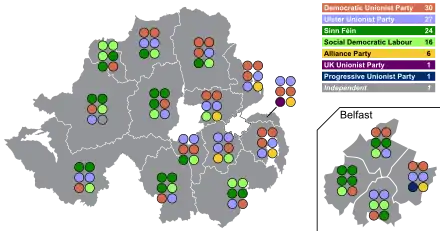 Seats won by each party per constituency. Voters elect 6 assembly members from the 18 constituencies. | |||||||||||||||||||||||||||||||||||||||||||||||||||||||||||||||||||||||||||||||||||||||||||||||||||||||||||||||||||||||||
| |||||||||||||||||||||||||||||||||||||||||||||||||||||||||||||||||||||||||||||||||||||||||||||||||||||||||||||||||||||||||
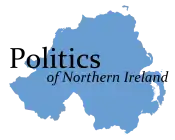 |
|---|
| This article is part of a series on the politics and government of Northern Ireland |
The election was originally planned for May 2003,[1] but was delayed by the Secretary of State for Northern Ireland.[1]
Political parties
On the unionist side, the Democratic Unionist Party gained ten seats, primarily at the expense of smaller unionist parties, to become the largest party both in seats and votes, with thirty seats. The Ulster Unionist Party increased their vote slightly, despite slipping to third place in first preference votes, and won 27 seats, a net loss of one. Shortly after the election three Ulster Unionist MLAs, Jeffrey Donaldson, Norah Beare and Arlene Foster, defected to the Democratic Unionists.
On the nationalist side, Sinn Féin saw a big increase in their vote, gaining six seats at the net expense of the Social Democratic and Labour Party, for a total of 24 seats.
The minor parties all saw a significant fall in their support. The Alliance Party managed to hold all six of its seats despite their vote almost halving, the Women's Coalition, United Unionist Coalition and Northern Ireland Unionist Party were all wiped out, and the Progressive Unionist Party and UK Unionist Party won just one seat each.
The biggest surprise of the election came in West Tyrone with the election of the independent Kieran Deeny, a doctor campaigning on the single issue of hospital provision in Omagh.
Several sitting MLAs stood under a different label to the one they had used in the 1998 election. Some had failed to be selected by their parties to stand and so stood as independents, whilst others had changed parties during the course of the assembly. Most of these realignments occurred within the unionist parties, with several defections between existing parties, and two new parties being formed – the United Unionist Coalition (formed by the three MLAs elected as independent unionists, though one later joined the Democratic Unionist Party) and the Northern Ireland Unionist Party (formed by four of the five MLAs elected as the UK Unionist Party, though one later left them, joined the Democratic Unionists for a period, then contested the election as an independent unionist). Neither the United Unionist Assembly Party nor the Northern Ireland Unionists won any seats in 2003.
Results

| Party | Leader | Seats | +/- | % of seats | Number | % of vote | |
| DUP | Ian Paisley | 30 | +10 | 27.8 | 177,944 | 25.7 | |
| Sinn Féin | Gerry Adams | 24 | +6 | 22.2 | 162,758 | 23.5 | |
| UUP | David Trimble | 27 | -1 | 25 | 156,931 | 22.7 | |
| SDLP | Mark Durkan | 18 | -6 | 16.7 | 117,547 | 17.0 | |
| Alliance | David Ford | 6 | 0 | 5.6 | 25,372 | 3.7 | |
| Independent | N/A | 1 | +1 | 0.9 | 20,234 | 2.9 | |
| PUP | David Ervine | 1 | -1 | 0.9 | 8,032 | 1.2 | |
| NI Women's Coalition | Monica McWilliams | 0 | -2 | 5,785 | 0.8 | ||
| UK Unionist | Robert McCartney | 1 | -4 | 0.9 | 5,700 | 0.8 | |
| United Unionist Council | Denis Watson | 0 | N/A | 2,705 | 0.4 | ||
| Green (NI) | John Barry | 0 | 0 | 2,688 | 0.4 | ||
| Socialist Environmental | Goretti Horgan | 0 | N/A | 2,394 | 0.4 | ||
| Workers' Party | Seán Garland | 0 | 0 | 1,881 | 0.3 | ||
| NI Conservatives | Michael Howard | 0 | 0 | 1,604 | 0.2 | ||
| NI Unionist | Cedric Wilson | 0 | N/A | 1,350 | 0.2 | ||
| Socialist Party | Peter Hadden | 0 | N/A | 343 | 0.0 | ||
| Rainbow Dream Ticket | Rainbow George | 0 | N/A | 124 | 0.0 | ||
| Ulster Third Way | David Kerr | 0 | N/A | 16 | 0.0 | ||
| Total | 108 | 0 | 100.0 | 692,028 | 100.0 | ||
- All parties with over 1,000 votes shown.
Electorate: 1,097,526; Valid votes: 692,028; Turnout: 63.05%.
- SOURCE: ARK website
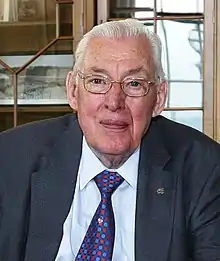
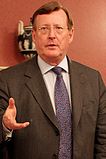
.jpg.webp)
